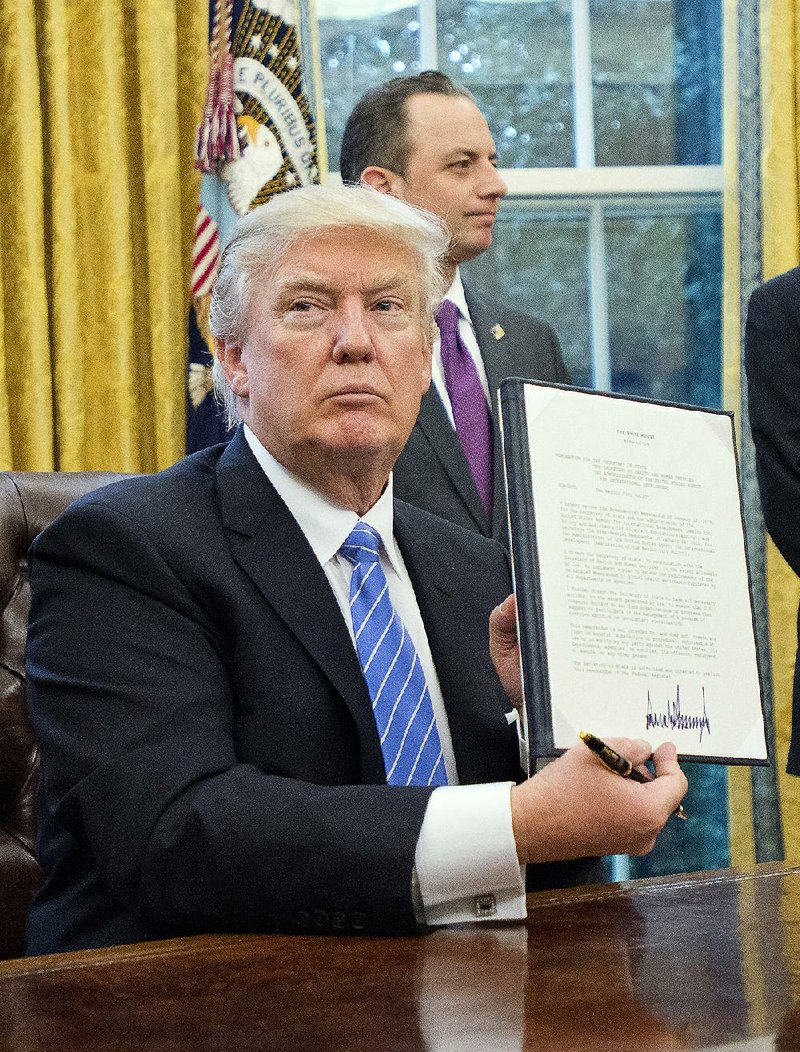UNITED NATIONS -- President Donald Trump reinstated a policy Monday that originated in the Ronald Reagan era, prohibiting U.S. foreign aid to health providers abroad who discuss abortion as a family planning option.
U.S. law already prohibits the use of U.S. taxpayer dollars for abortion services anywhere, including in countries where the procedure is legal. But this order freezes U.S. funding to health care providers in poor countries if they include abortion counseling or if they advocate the right to seek abortion in their countries.
Trump and Vice President Mike Pence had stated their opposition to abortion during the presidential campaign. Trump had signaled his intent to make the order one of his first acts as president, which pleased the anti-abortion lobby at home.
RELATED ARTICLES
http://www.arkansas…">Cutting rules, Trump tells execshttp://www.arkansas…">Ethics group sues, cites envoys in Trump hotels
http://www.arkansas…">Tillerson at State closer; Pompeo in at CIA
"We applaud President Trump for putting an end to taxpayer funding of groups that promote the killing of unborn children in developing nations," Carol Tobias, president of the National Right to Life Committee in Washington, the nation's largest anti-abortion organization, said in a statement.
[PRESIDENT TRUMP: Details on administration, previous coverage, photos, videos]
Critics said the order reflected what they regarded as the new administration's defiance of women's reproductive health rights, whose advocates were an important force in the weekend protest marches in Washington and other cities after Trump's inauguration.
The order revives what is known as the Mexico City Policy, so named because President Reagan announced it in 1984 during a U.N. population conference in Mexico City. Critics call it the Global Gag Rule.
As for the order's practical effects, health policy experts say restrictions on abortion services in the past have not led to a decline in abortion rates in countries that receive U.S. funding for reproductive health services, and they warn that those restrictions only heighten the chances of illegal, often unsafe, abortions.
The United States is the largest bilateral donor of reproductive health services abroad, according to the United Nations Foundation, which advocates greater support from the United States for the world body.
In recent decades, abortion rates have declined sharply in the richest countries, including the United States, where the rate has fallen to its lowest level since the Supreme Court legalized abortion in 1973, according to the Guttmacher Institute, a research group that supports women's right to have an abortion. It has remained steady in the developing world since the early 1990s.
The impact of the order is likely to be felt beyond abortion services, which cannot be carried out with any federal funding, under a 1973 law known as the Helms Amendment and named after former North Carolina Sen. Jesse Helms.
Critics say the order would hinder the ability of women in poor countries to access reproductive health services, including family planning, by severing U.S. funding to health clinics that offer a variety of services, including abortion counseling.
Information for this article was contributed by Rick Gladstone of The New York Times.
A Section on 01/24/2017
